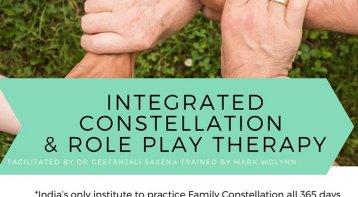When
Enquire Now to know the date
Where
Pune, Maharashtra, India
Pune, Maharashtra, India
Contribution
2500
Description
Mindfulness Course
Mindfulness is a wonderful tool for therapists to have at their fingertips.
The course discusses many techniques to help manage stress and pain levels and improve relationships. Where our suffering comes from is explained, looking in detail at our thoughts and emotions and how they rule us.
This stand-alone course takes the student through to meditation. However, Mindfulness is equally suitable for someone wanting to relieve depression or anxiety and improve relationships without wishing to practice formal meditation. Parents, children, siblings, friends, colleagues, and therapists can benefit from what this course offers.
Additionally, Mindfulness can be incorporated into other holistic therapies for a more connected client/practitioner relationship. Mindfulness techniques can be incorporated into weight loss, Counselling, Relaxation therapy, Reiki, Reflexology and so on.
This wonderful therapy can produce quite profound ‘life-changing’ results.
NTCS and IAI3 presenting 15 days workshop on
"Mindfulness"
International Certification will be provided to all participants, along with study material and ebooks.
Start date - 15-07-19
Duration - 15 days
Venue - Whatsapp
EE - Rs.2500/-
Early Bird
Rs. 999/-
Till 30th June - 2019
Topics
1. History and Basics of Mindfulness
2. Power of Mindfulness
3. Formal and Informal Practice
4. How to Become a friend of your emotion.
5. Achieve Well being with Mindfulness.
6. Detachment and Investigating self.
8. Breathing Spaces
9. Mindfulness and Stress.
10. Mindful stress management.
11. Mindfulness and Pain management.
12. Mindfulness and Relationship
13. Mindful listening
14. Mindfulness and Meditation
15. Body scan
16. Mindful eating (useful for weight loss).
Benefits of Mindfulness :
Health Benefits of Mindfulness for Kids and Students
Many studies have been conducted using college students as participants, as they are an easily accessible population that is often willing to participate for simple incentives like extra credit or some extra spending money.
Mindfulness studies with children as the participants are becoming more common as well, as more and more benefits of mindfulness on early development are discovered. We’ll describe some of the amazing outcomes associated with mindfulness on children, teens, and young adults here.
Benefits for College Students
Adults are not the only ones who can reap the benefits of mindfulness. College students have also experienced incredible positive impacts resulting from the practice of mindfulness.
A study on mindfulness in college students found that medical and psychology students who practiced mindfulness reported improvements in a wide range of areas, including decreased reactivity, increased curiosity and affect tolerance, improved patience, and self-acceptance, and enhanced relational qualities (Solhaug, Eriksen, de Vibe, Haavind, Friborg, Sørlie, & Rosenvinge, 2016).
Problems with alcohol are more prevalent in college students than many other populations and can lead to serious issues with both academic progress and life in general. Mindfulness may be an effective tool for addressing this issue, as it has been negatively linked with alcohol problems and can help students deal with the stress that may prompt drinking in this population (Bodenlos, Noonan, & Wells, 2013).
Improved Academic Success
Mindfulness is known to be effective in helping students achieve academic success in a variety of ways, and this benefit is not reserved for any specific group.
The following groups of children have enjoyed the benefits of mindfulness when it comes to their academic performance:
- Elementary students who practice mindfulness exhibit greater prosocial behaviors, emotion regulation, and academic performance (Harpin, Rossi, Kim, & Swanson, 2016);
- Teenagers studying for a general education certificate who participated in a mindfulness program experienced lower depression and anxiety, which contributed to improved academic attainment (Bennett & Dorjee, 2016);
- Children from lower socioeconomic backgrounds who participated in a five-week mindfulness program reported decreased stress, allowing them to focus on school (Costello & Lawler, 2014);
- Urban male youth who participated in MBSR experienced less stress, anxiety, and negative coping, improving their ability to deal with academic stress and achieve academic success (Sibinga, Perry-Parrish, Chung, Johnson, Smith, & Ellen, 2013);
- Children with ADHD displayed less aggression and conduct problems when exposed to mindfulness therapy, which helps them focus on their academics (Singh, Soamya, & Ramnath, 2016);
- Homeless middle school students who participated in a mindfulness course reported greater well-being and a higher incidence of using mindfulness in school, which can lead to greater quality of life and academic achievement (Viafora, Mathiesen, & Unsworth, 2015).
Buffer against Bullying and Depression
Mindfulness can even help kids deal with bullies!
A Chinese study on bullying victims and depression showed that mindfulness can protect children against the depressive symptoms that can arise from being victimized by bullies (Zhou, Liu, Niu, Sun, & Fan, 2017).
A dissertation by Sandra Mccloy (2005) on mindfulness as a coping tool for bullying suggested that mindfulness can help children consider perspectives other than their own and find constructive reactions in the face of bullying.
Mindfulness may even be an effective tool for addressing bullying at the source. Improving empathy with tools like mindfulness and improving social and emotional learning could be the key to stopping bullies before they become bullies (Kaldis & Abramiuk, 2016).
Provide Support and Boost Resilience
Mindfulness can also aid children who have been involved in the welfare or mental health care system. A study on a mindfulness program for vulnerable children found that mindfulness improved emotion regulation, mood, empathy, confidence, and self-esteem, coping and social skills, and ability to pay attention and focus (Coholic & Eys, 2016).
Resilience is a very effective skill for children to cope with daily struggles and develop emotionally, psychologically, and academically. Mindfulness training has been shown to boost resilience in children and help them understand and regulate their own emotions (Coholic, 2011; Coholic, Eys, & Lougheed, 2012).
1. Decreased Stress
If you read our piece on Mindfulness-Based Stress Reduction (MBSR), you know that mindfulness is considered a key element to fighting stress. An entire stress reduction program, with decades of experience and tens of thousands of practitioners, is an excellent indication that mindfulness works.
For an excellent dive into how mindfulness affects the experience of stress, check out the Little Book of Mindfulness by Rebecca Howden and Medibank. I’ll leave it to them to dive into the nitty-gritty, but I’ll describe their explanation of the relaxation response.
Howden and Medibank first list the symptoms of stress, including:
- Constantly feeling anxious and worried;
- Feeling irritable, agitated and easily annoyed;
- Argumentative and defensive with friends and family;
- Restless sleeping;
- Low levels of energy, often waking up feeling tired;
- Restless and frenetic mind;
- Often self-critical and/or critical of others;
- Feeling flat and uninspired;
- Having difficulty concentrating;
- Skin rashes and conditions;
- Clenching your jaw muscles and grinding your teeth at night;
- Headaches and migraines.
When you induce a state of relaxation, which can be achieved through mindfulness, another kind of meditation, or other activities, you can reap the benefits, including:
- Higher brain functioning;
- Increased immune function;
- Lowered blood pressure;
- Lowered heart rate;
- Increased awareness;
- Increased attention and focus;
- Increased clarity in thinking and perception;
- Lowered anxiety levels;
- Experience of being calm and internally still;
- Experience of feeling connected.
Gaining these benefits can be as simple as closing your eyes and being silent for a few minutes a day. This is a practice that is so easy, anyone can do it!
2. Enhanced Ability to Deal with Illness
Perhaps one of the most studied groups in terms of the impacts of mindfulness is cancer patients and others who are suffering from a chronic or potentially terminal illness. Mindfulness may not take away their symptoms, but it can help make them more manageable.
3. Facilitation of Recovery
Mindfulness can not only help you deal with a chronic or potentially terminal illness or life-threatening event, but it can also help you move on from it.
Mindfulness, yoga, and meditation have also been found to decrease anxiety and facilitate post-traumatic growth in breast cancer survivors, in addition, to increase vigor and spirituality.
4. Decreased Depressive Symptoms
Mindfulness has long been considered an effective supplemental treatment for depression. It has been found to decrease depressive symptoms, anxiety, and stress in college students, as well as increasing self-compassion when compared with yoga alone (Falsafi, 2016).
Mindfulness is even effective for people dealing with the most critical of depressive symptoms: suicidal ideation, or thoughts of suicide. In chronically depressed participants with suicidal thoughts, mindfulness was more effective than treatment as usual in reducing these thoughts (Forkmann, Brakemeier, Teismann, Schramm, & Michalak, 2016).
5. Improved General Health
Beyond the many mental health benefits of mindfulness, it can also improve your general health.
Finally, in a study on the impacts of mindfulness on the psychological and physical health of obese or overweight adults, researchers found that mindfulness helped participants lose weight, improve their eating behaviors and attitudes, and decrease depression and anxiety (Rogers, Ferrari, Mosely, Lang, & Brennan, 2017).
Reduced rumination.
Several studies have shown that mindfulness reduces rumination. In one study, for example, Chambers et al. (2008) asked 20 novice meditators to participate in a 10-day intensive mindfulness meditation retreat. After the retreat, the meditation group had significantly higher self-reported mindfulness and a decreased negative affect compared with a control group. They also experienced fewer depressive symptoms and less rumination. In addition, the meditators had significantly better working memory capacity and were better able to sustain attention during a performance task compared with the control group.
Stress reduction.
Many studies show that practicing mindfulness reduces stress. In 2010, Hoffman et al. conducted a meta-analysis of 39 studies that explored the use of mindfulness-based stress reduction and mindfulness-based cognitive therapy. The researchers concluded that mindfulness-based therapy may be useful in altering affective and cognitive processes that underlie multiple clinical issues.
Those findings are consistent with evidence that mindfulness meditation increases positive affect and decreases anxiety and negative affect. In one study, participants randomly assigned to an eight-week mindfulness-based stress reduction group were compared with controls on self-reported measures of depression, anxiety, and psychopathology, and on neural reactivity, as measured by fMRI after watching sad films (Farb et al., 2010). The researchers found that the participants who experienced mindfulness-based stress reduction had significantly less anxiety, depression, and somatic distress compared with the control group. In addition, the fMRI data indicated that the mindfulness group had less neural reactivity when they were exposed to the films than the control group, and they displayed distinctly different neural responses while watching the films than they did before their mindfulness training. These findings suggest that mindfulness meditation shifts people's ability to use emotion regulation strategies in a way that enables them to experience emotion selectively and that the emotions they experience may be processed differently in the brain (Farb et al., 2010; Williams, 2010).
Boosts to working memory.
Improvements to working memory appear to be another benefit of mindfulness, research finds. A 2010 study by Jha et al., for example, documented the benefits of mindfulness meditation among a military group who participated in an eight-week mindfulness training, a nonmeditating military group and a group of nonmeditating civilians. Both military groups were in a highly stressful period before deployment. The researchers found that the non-meditating military group had decreased working memory capacity over time, whereas working memory capacity among non-meditating civilians was stable across time. Within the meditating military group, however, working memory capacity increased with meditation practice. In addition, meditation practice was directly related to self-reported positive affect and inversely related to self-reported negative affect.
Other benefits.
Mindfulness has been shown to enhance self-insight, morality, intuition and fear modulation, all functions associated with the brain's middle prefrontal lobe area. Evidence also suggests that mindfulness meditation has numerous health benefits, including increased immune functioning (Davidson et al., 2003; see Grossman, Niemann, Schmidt, & Walach, 2004 for a review of physical health benefits), improvement to well-being (Carmody & Baer, 2008) and reduction in psychological distress (Coffey & Hartman, 2008; Ostafin et al., 2006). In addition, mindfulness meditation practice appears to increase information processing speed (Moore & Malinowski, 2009), as well as decrease task effort and having thoughts that are unrelated to the task at hand (Lutz et al., 2009).
About the organizers/facilitators
Dr. Neeta Parate, a very dynamic lady contributing in education industry from last 20yrs. She is PhD, MCA, MBA, she is Recipient of many prestigious awards like "Bharat Shikshya Ratan Award", "Glory of India" etc. She is a Trainer, Mentor, Author, Coach, Motivational Speaker and Educationist. She is also a social worker her work in the field of woman empowerment and child development is recognizable.
She has written 3 books and more than 500 research papers, and articles.
She is CEO MD of "Neeta training and consultancy services", President International Association of Industry Institute Interface (IAI3), and CEO of Neeta overseas(Import Export firm in Agricultural Products).
Her signature program "I am a Winner, Believe & Achieve", she has delivered to thousands of participants, it was also their on community Radio Channel "Puneri Awaz".
Venue
- Pune, Maharashtra, India, Pune, Maharashtra, India
Testimonials
Be the first to review
Be the first to review
Other Meditation Workshops/Events









